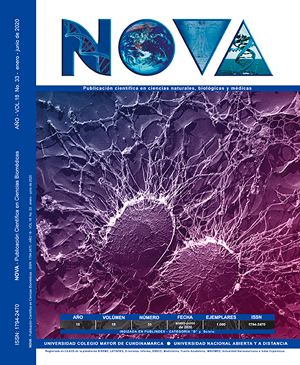NOVA por http://www.unicolmayor.edu.co/publicaciones/index.php/nova se distribuye bajo una licencia Reconocimiento No Comercial- Compartir igual
Así mismo, los autores mantienen sus derechos de propiedad intelectual sobre los artículos,
Declaración de privacidad.
Los nombres y las direcciones de correo electrónico introducidos en esta revista se usarán exclusivamente para los fines establecidos en ella y no se proporcionarán a terceros o para su uso con otros fines.
In vitro activity of the ethanolic extracts from Lantana camara L., Petiveria alliacea L. and Lippia dulcis T. against pathogenic bacteria
Introduction. Colombian biodiversity and traditional knowledge allow the exploration of medicinal plants with potential antimicrobial activity, which could be used to treat infections. Objectives. To determine the antibacterial activity of ethanolic extracts of Lantana camara L., Petiveria alliacea L. and Lippia dulcis T. on Pseudomonas aeruginosa ATCC 9027, Escherichia coli ATCC 25922, Proteus vulgaris ATCC 6380 and Staphylococcus aureus ATCC 25923. Materials and methods. Performed the acquisition of plant material and botanical characterization, ethanolic extracts were obtained by percolation and preliminary phytochemical characterization was performed by thin layer chromatography (CCD). The antibacterial activity was evaluated by disc diffusion and agar diffusion tests at concentrations of 1mg/mL and 2mg/mL; for active extracts, the Minimum Inhibitory Concentration (MIC) and Minimum Bactericidal Concentration (CMB) were established. For statistical analysis, Student's t test was performed. Results and discussion. Staphylococcus aureus ATCC 25923 was sensitive with Lantana camara L. and Lippia dulcis T. The latter being also active on Proteus vulgaris ATCC 6380 with inhibitory effect higher than 50%. The extract of Lippia dulcis T. had the highest inhibitory activity on S. aureus (MIC: 1.95 mg/mL). No extract showed activity on Escherichia coli and Pseudomonas aeruginosa. Secondary metabolites, especially terpenoids and coumarins were detected in L. dulcis. Conclusions. The study shows that natural products derived from medicinal plants such as the ethanolic extracts of Lantana camara and Lippia dulcis have antibacterial activity on S. aureus and P. vulgaris and could be a promising alternative for the treatment of bacterial infections.









